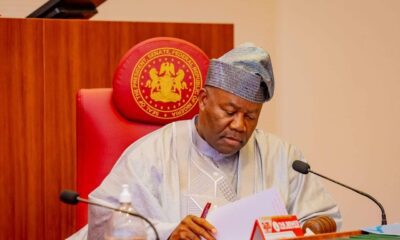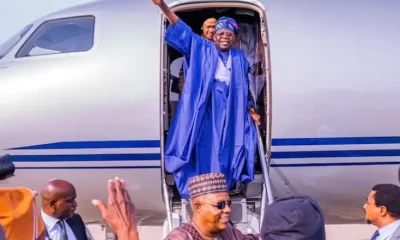Political Issues
INEC, a failed electoral system regulator -By Sesugh Akume

To be sure, I agree that having 91 (or so) political parties in Nigeria is outrageous. I also concede that the Independent National Electoral Commission (INEC) has the power to deregister parties. The issue for me however, is INEC just abused their powers and failed to follow the law as it is. That’s for the law courts to settle, as we at the Abundant Nigeria Renewal Party (ANRP) are surely challenging the travesty in court.
INEC, the election management body, itself however, creates the problems that lead to having multiple parties in the first place. And so does the law, which Buhari refuses to sign the amendment in order to entrench fairness and transparency in the entire process. He prefers the chaos that comes with the status quo, in order to benefit from it.
INEC has got to be the worst institution we have in Nigeria (in my opinion, they share a tie with the police or are only slightly behind.) I did an FOI (Freedom of Information) request there since November 2018. I needed the House of Representatives election results for Sankera (in Benue) for 2011, and 2015, as I was running for the office in February 2019. Up to this moment I haven’t gotten a response for something that should take 7 days maximum.
I wouldn’t want to go into detail on the utter confusion I met on the ground in the INEC offices at the local government level. But suffice to say that I had more information on what was required to be submitted at their offices, and when, than they did. Participating for the very first time beyond being a supporter of candidates and a voter, I knew more than they, what was expected. For instance, we were to submit a list of party agents by January ending. I went to enquire the format for submitting it, the then electoral officer my local government wasn’t aware of this! I asked for a dummy or specimen copy of the ballot paper for public awareness, he didn’t know what I was talking about. I asked when party officials and agents would be enlightened about the electoral process, in order to work well with them, he looked at me like I was from Pluto.
Okay, I asked, how will the parties be listed on the ballot paper? He didn’t know. When my stress was becoming too much for him, he give me the contact details of his boss at the state headquarters. I was reliably told it’d be in the alphabetical order of the parties’ acronyms. Mine was ‘ANRP’ so I was to be number 4 on the ballot paper, in the order the list of candidates was published. I went to town confidently telling everyone to close their eyes and count 1—4 and to vote the 4th party.
Nineteen of us ran for the Sankera House of Reps position. On election day, the ballot paper had 29 parties instead of 19. Where and how INEC got the extra 10 remains a mystery to this day. ANRP, therefore, somehow became the 6th on the ballot paper. Guess what had been happening until a voter somewhere realised this error and reached out! That was when phone calls began going round. Not so many of the electorate can easily read. It’s why party symbols are primal in our setting. It’s why we go to great lengths to ensure that we make it easier for people to vote correctly either by memorising the symbol or knowing where and how to vote.
One week to the election, the local electoral officer made a frantic call across that the deadline for submitting the names and particulars of party agents (which was a form to be filled, with passport-size photographs attached, and countersigned by party officials at various levels) was in 2 days! To give perspective to this, I had up to 700 or so polling units in my constituency, that’s at least 700 agents. In some locations, there is no telephone network or access, somebody has to go there. In some locations also, it takes close to a day’s journey. How was this to work in 48 hours or less? They later extended the deadline. Having gone through all the hassle to do the right thing, and get them the details, they did NOT use the information. It was all a decoy to keep us, the uninitiated, busy and distracted. APCPDP for instance, submitted nothing, and nothing happened.
Thousands applied to be polling agents and were trained. The best were shortlisted. Publishing the names became another hassle. The names ought to have been published, with officials mobilised adequately to report at their places of assignment. In the end, totally unknown people who didn’t train at all were the polling officials, and it showed. This I saw myself in my polling unit (a relation too came into town the day before the election to conduct it, having not been trained.) The polling officials kept goofing at every stage, it was those who were trained that volunteered to help the process move.
Elections were concluded on Saturday. In some cases, by Wednesday the polling results were yet to be officially announced by INEC. Among these were results from collection centres wihin the same town. By this I mean, when election results are published at the polling unit, they are taken to the ward collection centre, and then to the local government INEC office. I’m saying from the ward collection centre in one part of the town to the INEC office in the other within a 3-kilometer radius took more than 4 days. These are the elections INEC conducts and announces winners. And says if one doesn’t win they don’t qualify to be a registered political party.
I didn’t mention the open, blatant vote buying with cash and other inducements right there on the voting queue. Not INEC, not law enforcement, saw anything wrong with this.
Pray, tell, how does one compete in this sort of setting and win or lose fairly?INEC, the regulator, blames it all on the politicians. I witnessed Festus Okoye, an INEC commissioner, saying there are polling units in thick forests in the middle of nowhere. Am I the one who designated the polling units? Or did they designate themselves?Party primaries are held. INEC is present to record all the proceedings. In the end, parties submit totally different (forged) results, sometimes, even substituting candidates, yet INEC accepts. How can one then compete within the parties to win or lose in a fair contest? These malpractices only but limit and constrict the space for participation. Others therefore seek alternatives to find expression, to exercise their franchise and ventilate their aspirations. This is not to say that political parties are not also set up as special purpose vehicles by political entrepreneurs and merchants. The point is, if INEC were doing its job these wouldn’t come up in the first place or would die naturally from regulation, not meeting the rigours of a properly run party. After the election, I, as my colleagues in ANRP, retired our campaign finances: what came in, what was spent, and how. Aside from sending it to each individual who contributed to the campaign, I sent it to my party, as should. The party not only submitted election expenses to INEC but our audited accounts. We have a verifiable list of our members with phone numbers and email addresses (for those who have) and other details. The current number of our registered members is there on our website. Not everyone wants to belong to a party of ‘anything goes’. Buhari himself, for instance, has been running for office since 2002, how many times has he or any of his parties retired campaign funds? What has INEC ever done about it? Certainly, not him alone, all the ‘successful politicians’. How many does INEC insist they do the right thing or face the consequences, so that this way we can build a culture of open, transparent, accountable campaign financing?
Were parties properly run, and were INEC doing its job, as should, there would be fewer parties in the first place. There would be fewer election litigations. We would have better quality elected public officials.
PS: I’m interested in seeing the 2019 presidential election results. I have that for 2015. I want to see the breakdown of the total votes cast, and where the votes came from per state, local government, and ward, so I can do the maths myself. I’ve searched everywhere but can’t find. I hope INEC is not ashamed of itself and can’t publish what clearly does not add up? Or is not publishing the full breakdown of the results also what the law says? Help me, someone, if you have access. Thanks in advance.



















